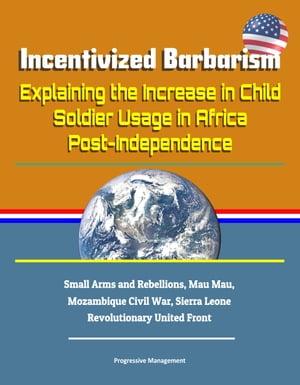Incentivized Barbarism: Explaining the Increase in Child Soldier Usage in Africa Post-Independence - Small Arms and Rebellions, Mau Mau, Mozambique Civil War, Sierra Leone Revolutionary United Front【電子書籍】[ Progressive Management ]
Incentivized Barbarism: Explaining the Increase in Child Soldier Usage in Africa Post-Independence - Small Arms and Rebellions, Mau Mau, Mozambique Civil War, Sierra Leone Revolutionary United Front【電子書籍】[ Progressive Management ]
<p>This excellent and interesting report has been professionally converted for accurate flowing-text e-book format reproduction. Child soldiering has become common in Africa. This was not always the case; many African cultures had traditions that prevented children from taking part in combat until physically mature enough to do so. Neither was child soldiering common during colonial occupation of Africa. Starting after independence from colonial powers, however, African children have either chosen to fight in armed forces groups or have been forced to fight by state and by rebel entities. What has led to the rise of child soldier usage in post-independence era rebellions? This research reviews conflicts before and after two critical historical points, independence from colonial powers and the end of the Cold War, to understand the trajectory of child soldier usage. Multiple cases are examined, with pre-independence represented by the Mau Mau Rebellion, the interim period by the Mozambique Civil War, and then post-Cold War by analyzing Sierra Leone's Revolutionary United Front. Through comparative analysis of these rebellions, this thesis identifies the factors that have led to increased usage of child soldiering. This thesis recommends increased focus on a non-proliferation policy of small arms, as the efficiency and proliferation of these arms encourages child soldier usage.</p> <p>This compilation includes a reproduction of the 2019 Worldwide Threat Assessment of the U.S. Intelligence Community.</p> <p>I. Introduction * A. Major Research Question * B. Significance of the Research Question * C. Literature Review * 1. A Post-Colonial Problem * 2. Theories of Child Soldiering * 3. Assessing the Theories * D. Potential Explanations and Hypotheses * E. Research Design * F. Thesis Overview and Chapter Outline * G. Conclusion * II. Increase in Child Soldiering After Independence: The Mau Mau Rebellion and the Mozambican Civil War * A. Child Soldier Usage Before and After Independence * B. Relative Power and Duration of the Military Conflict * 1. The Mau Mau Rebellion * 2. Mozambique Civil War * C. Small Arms Availability and Efficiency * D. Changing Values in Child Soldier Usage * E. Conclusion * III. Increase In Child Soldiering After The Cold War: Sierra Leone's Civil War * A. Child Soldier Usage After the Cold War * B. Relative Power and Duration of the Military Conflict * C. Small Arms Availability and Efficiency * D. Conclusion * IV. Conclusions * A. Summary of Research * B. Findings * C. Recommendations for Future Research * D. Implications and Policy Recommendations</p>画面が切り替わりますので、しばらくお待ち下さい。
※ご購入は、楽天kobo商品ページからお願いします。
※切り替わらない場合は、こちら をクリックして下さい。
※このページからは注文できません。
- 商品価格:742円
- レビュー件数:0件
- レビュー平均:0(5点満点)
- ショップ :楽天Kobo電子書籍ストア
